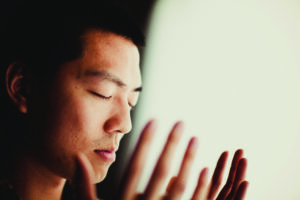
God’s True Tabernacle
What is the difference between true and false religion? On the surface they may have some similiarities. But God approves of one and abhors the other, because God has commanded one and has not commanded the other, no matter how similar they may be. The difference between true and false religion is seen in Stephen’s contrast between two tabernacles.
7:43-44. There is the tabernacle of Moloch (“‘You also took up the tabernacle of Moloch’”) and there is the tent of the Lord (“Our fathers had the tabernacle of witness in the wilderness”). The contrast, as suggested by v 44, is basically threefold.
First, the Lord’s tabernacle was a “tabernacle of witness.” It was a witness to God’s presence with His people, and of His gracious willingness to forgive as expressed in the sacrificial system connected with it. It was also a witness for a day to come, foreshadowing the heavenly realities of Christianity (cf. Hebrews). It was a type of Christ in His incarnation (cf. John 1:14). Thus it was rich in the divine truths to which it bore witness. By contrast, the tent of Moloch witnessed to nothing except to a lie and to an abomination.
In the same way, divine worship is ever distinguished from human and satanic religion by its witness to God’s truth. The Christian Church is a pillar—hence a witness—to the very truth which the OT tabernacle typified God manifest in the flesh (cf. 1 Tim 3:14-16).
Second, the Lord’s tabernacle was a divine appointment (“as He appointed”). By contrast, Moloch’s tabernacle was divinely reprobated (cf. Leviticus 20). The man who says he can worship better at home or out of doors ignores the divine appointment of the church. Divine worship is distinguished from human by its being based on God’s command. As no one would seek audience with a President without appointment, so man’s approach to God in worship must be by divine appointment. When human commandments pervade worship, that worship is in vain (cf. Mark 7:7).
Third, the Lord’s tabernacle was based on a pattern (“make it according to the pattern that he had seen”). God did not simply appoint the tabernacle to be made and left the details to Moses. Neither does He divinely appoint the local assembly and leave it to men to organize and arrange it as best they can. The local assembly is to gather according to the pattern revealed in God’s Word.
Nor could Moses have been criticized for not using more ornate materials in that tabernacle, whatever the mind of man might have deemed suitable for God’s tent. Neither can the accoutrements of human religion (e.g., ornate buildings, stained glass windows, soft music from an organ, etc.) be insisted upon by men, as they are no part of the revealed pattern of true worship for today. God delights in obedience to the revealed pattern of His Word. Men must worship in Spirit and in truth.
The three points of contrast just noted are significant especially because it was not the worship of Yahweh alone that involved a tent. So did the idolatrous worship of Moloch. The worship of Moloch (as well as of Remphan) also involved patterns of human making (“images which you made,” v 43). Indeed, portable shrines employing practically the same construction techniques as the tabernacle are now known to have been in use before the time of Moses in Egypt. It is thus possible that over the ancient world numerous “tent shrines” were in use for pagan deities.
Externally there might appear to be a resemblance between the true worship of Yahweh and the false worship of Moloch and others. Likewise, in the ecumenical movement, men seek to stress external, superficial similarities in order to achieve union. But true and false religion are, like these two tents, separated by a vast distance by the very three facts that emerge from v 44. To suggest combining Moloch’s tent with the Lord’s would be utterly unthinkable—in that day or in this!
History Repeating
7:44-50. The nation has already been viewed by Stephen as set aside (“gave them up,” v 42) and, under the leading of the Spirit, this is connected with the Babylonian captivity (v 43). Thus, in essence, the history of Israel has been fully traced from Abraham (v 2) to the exile (v 43). The few verses that remain serve to shed light on the privileges which continued to be theirs till the judgment fell. From these, three facts emerge.
First, they had the presence of divine witness (“the tabernacle of witness”).
Second, they had the display of divine power (“God drove out…”).
Third, they had the exercise of divine grace (“who found favor”). David’s request was, in reality, an expression of that grace. God gave grace both for the asking of such a request and in answering it, for He was greater than the temple (vv 47-50). It was God’s work in David’s heart that prompted the prayer, His work in Solomon’s life to answer it, and His condescension in Israel’s history to link Himself with that temple. All was grace.
In Stephen’s own generation this history had repeated itself. Although judgment seemed certain to come to that generation as early as John the Baptist’s ministry (cf. Matt 3:7-12), yet God’s operation among them paralleled the picture Stephen paints from history. The ministry of John and of our Lord, ending with the death of both, showed plainly the true state of affairs. Yet the Apostolic Church follows with its display of divine witness, power, and grace.
It would seem, both from the history recounted by Stephen, and from its corollary in his own day, that though God may “give up” a nation or generation, yet He may also thereafter, and before judgment strikes, display a more marvelous light of witness and grace than before. Thus, from the tabernacle to the temple there is a progression from what is less obvious to that which is more obviously glorious.
These two buildings find their anti-types in Stephen’s day—the tabernacle in Christ in humiliation, and the Temple in the Church (Eph 2:20-21) wherein Christ is glorified and which is a witness to His glory. Hence the out-flashing of God’s glory—in His personal presence, and in His miraculous works, in His matchless grace—seems, both in Stephen’s OT account and in his own day, to blaze forth more brightly just before the night falls, like the sun blazing mere brilliantly red in the midst of gathering shadows just before it sinks beneath the horizon. Judgment may come to a nation (like our own) or to an individual just after some unusually brilliant display of divine witness and grace.
In the midst of a nation “given up,” one man, David, found “grace” to make a right request. Unselfishly he seeks a habitation for God (cf. 2 Sam 7:2). It takes grace to ask a right request, for selfish asking is so easy (cf. Jas 4:3). We too, in an age of impending judgment upon our nation and the world, as also upon a lukewarm church sure to be spewed out (Rev 3:16, “I will spew thee out . . .”), we too may have the privilege of asking (and getting an answer) to “find a tabernacle”—i.e., find an abode for—the Lord. Indeed, according to John 14:23, He makes His abode in every obedient life (cf. also Rev 3:20-21 against the backdrop of Laodicea).
Thus, in the tabernacle of our body, the earthly house of this tabernacle (2 Cor 5:1)—this wish may be fulfilled by grace. We, like David, find a place for God to dwell.
The word skēnōma of Acts 7:46 may also suggest the impermanence of the “house” (oikon) which Solomon built. By application, our fellowship with Christ here on earth is in this our transient home of flesh (cf. also Acts 6:14).

Role Reversal
7:51-53. “You stiff-necked and uncircumcised in heart and ears!” The trial of Stephen is remarkable in that the judges become the defendants, the accused becomes the prosecutor. The nation is on trial before God through His angelou, Stephen (cf. 6:15). The indictment, based on the incontrovertible witness of Scripture, is now summed up by Stephen in these verses.
“Which of the prophets did your fathers not persecute?” having traced the past history of the nation, the culmination of that history in the crucifixion of Christ is stressed (v 52). Proud as they were of their law, which Stephen was accused of blaspheming (Acts 6:13), yet by betrayal and murder of a righteous One they had actually broken it (v 53).
Note that in the scheme of Stephen’s message, vv 48-50, there is a tacit reminder that God did not need Solomon’s temple. The Babylonian captivity (cf. Acts 7:43), as all knew, had destroyed it. The charge against Stephen (Acts 6:14) might then be presumed to have a possibility of truth in regard to the present temple. No more did such a God need Herod’s temple.
This trial of the nation was the turning point for Israel. In the next chapter (Acts 8), the gospel oversteps the confines of Judaism. And after that, the great Apostle to the Gentiles is saved (Acts 9). Sentence was passed on Judaism, Jerusalem, and the nation. Samaria and the uttermost part of the earth now come to view.
Indeed all who stand exposed to the convicting work of the Word are, so to speak, on trial before God (cf. Heb 4:12-13). God may, as with Israel, at any such moment pass sentence and chasten or judge. (Note that this same two-edged sword was here in Stephen’s hand, Acts 7:54.)
Diagnosis
But Stephen was not only a prosecutor, he was also a diagnosing physician. For the nation of Israel was not only guilty, but sick. Note its symptoms:
First, they had neck trouble (“stiff-necked”). As a physical stiff neck may be caused by holding the head in a fixed position, so spiritual stiff-neckedness is fixity of mind upon self-will. The stiffnecked soul refuses to bow his head in submissiveness or turn it in the direction of God’s leading. In the body a stiff neck may be of slight concern, not so for the soul (1 Sam 15:23).
Second, heart and ear trouble (“uncircumcised in heart and ears”). Stubbornness permits the thoughts and attitudes of the flesh to prevail upon the heart and, prevailing in the heart, to shut the ear. Note the order. If the soul cannot discerningly and obediently hear God’s voice, it is a symptom of heart trouble.
Third, balance trouble (“resist,” i.e., “to fall against”). As in the body the inner ear controls the balance, so the “inner ear” of the soul controls the balance of the life. An uncircumcised ear leads to “falling against”—i.e., resisting—the Holy Spirit. One can either “walk by means of the Spirit” or fall against
Him (cf. Gal 5:16). Balance, stability, and evenness of life are only achieved by Him as the inner ear of our souls is attuned to Him.
Fourth, their disease was hereditary (“as your fathers did, so do you”)—and it was getting worse. Note progression in v 52:
• Persecuted the prophets.
• Killed the prophets.
• Murdered the Just One.
Sin, a hereditary disease beginning in Adam, always worsens from generation to generation unless checked by repentance and submission to God. Ultimately it becomes fatal, and—as with this generation of Israelites—issues in judgment.
The Twofold Ministry
7:54-55. When they heard these things they were cut to the heart. The twofold ministry of the Holy Spirit in this world is seen in this chapter.
His convicting work (John 16:811) is seen in v 54. This is toward the world.
His work in the believer finds illustration in v 55, But he, being full of the Holy Spirit, gazed into heaven (cf. John 16:13-14). The Spirit desires to fill us, fix our gaze steadfastly on heaven, and to reveal to us the glory of God and Jesus at His right hand (cf. Col 3:1-4).
The effect of such a vision will be, for one thing, testimony (cf. Acts 4:20). Note v 56: and said. We too can testify to men that we see the heavens opened (the veil rent) and the Son of Man in glory in heaven. Our message to the world is just this: an opened heaven, an exalted Man.

The Effect of the Vision
7:56-60. Stephen is oblivious to the gnashing of teeth around him. His eye is on heaven. Human prudence might have dictated silence now, but a heavenly vision makes him speak. When we have a real heart vision of Christ, we will speak regardless of man’s hostility.
Another effect of this vision upon the believer will be his transformation in life, heart, and experience into the likeness of Christ (2 Cor 3:18). Note three likenesses of Stephen to his Lord in vv 57-60 which are principles of Christlikeness in the believer:
First, suffering: they cast him out…and stoned him (vv 57-58; cf. 2 Tim 3:12; Luke 23:24).
Second, confidence and repose in God: “Lord Jesus, receive my spirit.” Note there was no crying to men for mercy (cf. Luke 23:46).
Third, forgiving love: Lord do not charge them with this sin (cf. Luke 23:24).
From a human standpoint, Stephen’s death must have seemed a tragedy to the early Church. If, as is probable, he was a young man, it was seemingly the cutting off of a fruitful, flowering career. He is the first, besides the Apostles, to be recorded by Luke as performing miracles (6:8) and he had risen from waiting tables to effectual public witness for the Lord Jesus (6:9-10). The loss of such a man must have seemed great indeed. Yet, like Samson, he accomplished more in death than in life and his dying prayer had stupendous fruit.
The phrase, “do not hold against,” is not to be taken as an appeal to God to ignore this sin. The cross proves God cannot ignore sin. But this is an appeal to God not “to fix” this sin upon them, not to make it a final one in His dealings with them. God is ever at liberty to say that His Spirit will not always strive with man, and when such striving ceases, judgment alone is left. Yet, through Stephen’s prayer, the Spirit continues—indeed intensifies—His striving with the young man Saul (v 58) until He had made him the great Apostle to the Gentiles (cf. Acts 9:5). The multitudes saved and edified in Paul’s lifetime and in the 1900 years following defies computation. All this as the result of a single sentence prayed! This shows the staggering potential of prayer (cf. Eph 3:20).
It is not a coincidence that this prayer is preceded by the vision of v 56. For the man of prayer, in this age, is one who catches a vision which is twofold:
First, “The heavens opened” (Heb 10:19-20).
Second, “The Son of Man… on the right hand of God” (Heb 10:21).
Note it is here “Son of Man” and not “Son of God.” For the high priesthood of Christ and His mediatorial work depend on His manhood (1 Tim 2:5; Heb 2:17-18).
Stephen thus sees within the veil in v 56, and in v 60 He is there. Then he knelt down and cried out with a loud voice, “Lord, do not charge them with this sin.” When we kneel before God it is our privilege to be within the veil. The Spirit’s ministry with us—as with Stephen—is both to give us this vision and this experience. Then Stephen’s spirit went there permanently. The request of v 59 is in process of being answered in v 60. For Stephen’s “spirit” and that of “the Lord Jesus” are united in this prayer for the possibility of forgiveness of sinners. As the soul unites with its Lord in prayer it is ever more ready to unite with Him in presence.
In prayer we accomplish what is far beyond our talents and skills. Stephen could not reach these hardened hearts. His sermon only moved them to violence. Saul was a superlative example of this hardness. Yet Saul was not too hard for God. All our gifts, or all of Stephen’s here, cannot do what prayer can do. Here is an illustration of John 14:12-14. The miracle of Saul’s conversion and its fruits fully vindicates John 14:12. Yet actually it was the Lord personally Who did it (John 14:13 “I will do it,” cf. Acts 9:4-6). In prayer we do what we cannot do, for we ask that He will do it.

